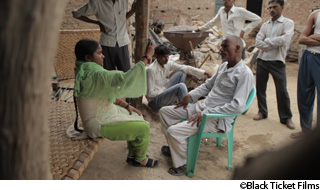Writing With Fire
 INDIA / 2021 / Hindi / Color / DCP / 93 min
INDIA / 2021 / Hindi / Color / DCP / 93 min
Directors, Editing, Producers: Rintu Thomas, Sushmit Ghosh
Photography: Sushmit Ghosh, Karan Thapliyal
Original Score: Tajdar Junaid
Sound Design: Susmit ‘Bob’ Nath
Executive Producers: Patty Quillin, Hallee Adelman
Co-Producers: John Webster, Tone Grøttjord-Glenne
Source, World Sales: Autlook Filmsales
The state of Uttar Pradesh in Northern India is home to the newspaper Kabar Lahariya, founded entirely by women who are Dalit, a group excluded from the caste system. Smartphones in hand, they painstakingly gather information and shoot videos on important topics that major media outlets dismiss—incidents caused by mining operations and cases of sexual violence against women—publishing them through their online platform. With an unwavering conviction even in the face of relentless discrimination and prejudice, they gradually win people’s trust and begin to attain widespread influence. The film depicts the struggles of these strong-willed journalists who not only overcome the hurdles of everyday life but also find a way to make change in the world around them.
[Director’s Statement] India is deeply complex, divided in four by its 3,000-year-old hierarchy, the caste system. Exclusionary like racism, but worse—caste is invisible. From birth to death, your caste sticks to the deepest part of you, your identity. Perhaps the world’s oldest social hierarchy, this discriminatory practice is illegal but still widespread. Dalits are considered too “dirty” to even have caste, enduring among the most brutal oppression and violence in the world—sometimes lynched simply for crossing paths with an upper caste. Now imagine being a Dalit woman—literally the bottom of Indian society, no agency, absolute invisibility.
So Meera’s work interested us, especially when her newspaper was transitioning from print to digital—we were curious how Dalit women would employ technology and the internet to amplify their voices. As most print media reacted uneasily to the digital medium, these rural women strategised their growth in a competitive, upper-caste, male-dominated news landscape. They began redefining the perception of Dalit women in India. All this as a Hindu majoritarian party trying to reinforce the caste system in every aspect of life moved India’s secular democracy towards right-wing nationalism. So Meera and her journalists’ work becomes even more phenomenal—David versus Goliath—because they challenge forces much larger than themselves, where the pen (or in this case the mobile phone) becomes mightier than the sword. In our story, we create a narrative that allows the viewer to see Meera’s world from within, intimately and respectfully, and experience a story that is both unique and universal.
 Rintu Thomas and
Rintu Thomas andSushmit Ghosh
Director-producers from India aiming to create transformative social impact, their work has been supported by the Sundance Institute, Chicken & Egg Pictures, Tribeca Institute, Doc Society, SFF Film Fund, IDFA, The Bertha Foundation, Sørfond and the Finnish Film Foundation. Founded in 2009, their Black Ticket Films production company for non-fiction storytelling emphasizes social justice stories—institutions around the world use its films as advocacy, impact and education tools. Recognised for their work with the highest honour for filmmakers in India, a President’s Medal, in 2012. Married for six years, they live between New Delhi and the mountains, and enjoy discovering quaint bookshops. Writing With Fire is their first feature documentary.
